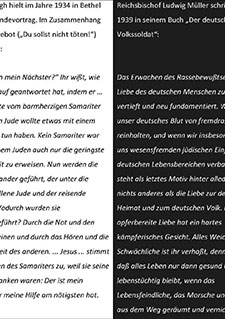Bodelschwingh and the so-called “Jewish Question”
Bodelschwingh held back with public protest against Nazi injustice. He believed that the church’s mission was to preach the Gospel. He largely avoided referring to the current political situation. Nevertheless, such allusions are found implicitly. In 1934, he gave his congregation at the Bethel Institution instruction in Luther’s Small Catechism. In conjunction with the Decalogue’s commandment against killing, he talked about the Parable of the “Good Samaritan” and called the Jew who fell among murderers, my neighbor who has most urgent need of my help.
That could already be understood at that time as a demand for Christians to stand by Jews who were increasingly being deprived of their rights and harassed. Without a doubt, Bodelschwingh’s subtle and indirect remarks fall short of the clear and courageous comments of a Dietrich Bonhoeffer on the “Jewish Question”, who had already demanded not only to bind up the victims under the wheel but also to jam the spokes of the wheel itself in 1933. Nonetheless, they stood in sharp contrast to the radical remarks of his successor in the office of Reich Bishop who, as a German Christian, also shared the Nazis’ racial ideology.
Source / title
- Left quote from F. von Bodelschwingh, Lebendig und frei, Bethel 1949, 20; right quote from Ludwig Müller, Der deutsche Volkssoldat, Berlin 1939, 56f.

